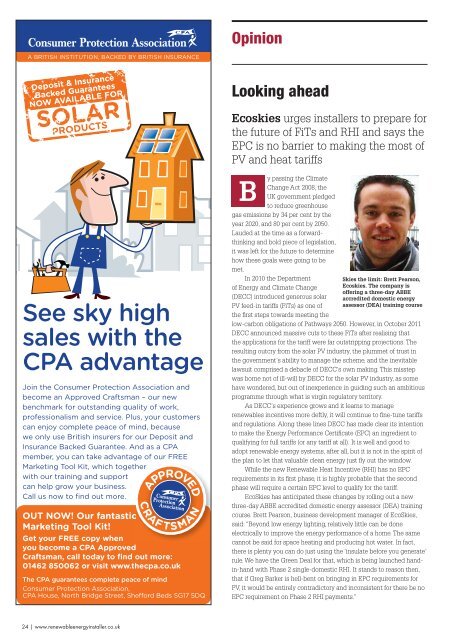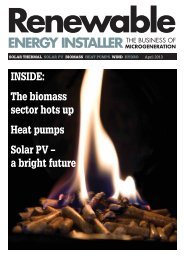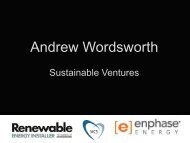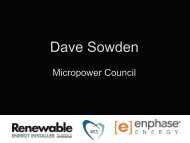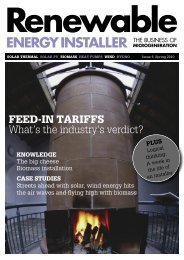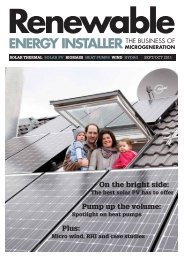REI Mar-Apr 2012 - Renewable Energy Installer
REI Mar-Apr 2012 - Renewable Energy Installer
REI Mar-Apr 2012 - Renewable Energy Installer
Create successful ePaper yourself
Turn your PDF publications into a flip-book with our unique Google optimized e-Paper software.
��������������������������������������������������<br />
�������������<br />
���������������<br />
�������������<br />
���������������������������������������������<br />
���������������������������������������<br />
�������������������������������������������<br />
��������������������������������������������������<br />
������������������������������������������<br />
�������������������������������������������������<br />
�����������������������������������������<br />
�������������������������������������������<br />
�����������������������������������<br />
������������������������������<br />
�����������������������������<br />
�����������������������������<br />
�����������������������<br />
�������������������<br />
������������������������<br />
��������������������������<br />
����������������������������������������<br />
��������������������������������������<br />
�����������������������������������������<br />
���������������������������������<br />
������������������������������������������������������<br />
24 | www.renewableenergyinstaller.co.uk<br />
Opinion<br />
Looking ahead<br />
Ecoskies urges installers to prepare for<br />
the future of FiTs and RHI and says the<br />
EPC is no barrier to making the most of<br />
PV and heat tariffs<br />
y passing the Climate<br />
B<br />
Change Act 2008, the<br />
UK government pledged<br />
to reduce greenhouse<br />
gas emissions by 34 per cent by the<br />
year 2020, and 80 per cent by 2050.<br />
Lauded at the time as a forwardthinking<br />
and bold piece of legislation,<br />
it was left for the future to determine<br />
how these goals were going to be<br />
met.<br />
In 2010 the Department<br />
of <strong>Energy</strong> and Climate Change<br />
(DECC) introduced generous solar<br />
PV feed-in tariffs (FiTs) as one of<br />
the first steps towards meeting the<br />
Skies the limit: Brett Pearson,<br />
Ecoskies. The company is<br />
offering a three-day ABBE<br />
accredited domestic energy<br />
assessor (DEA) training course<br />
low-carbon obligations of Pathways 2050. However, in October 2011<br />
DECC announced massive cuts to these FiTs after realising that<br />
the applications for the tariff were far outstripping projections. The<br />
resulting outcry from the solar PV industry, the plummet of trust in<br />
the government’s ability to manage the scheme, and the inevitable<br />
lawsuit comprised a debacle of DECC’s own making. This misstep<br />
was borne not of ill-will by DECC for the solar PV industry, as some<br />
have wondered, but out of inexperience in guiding such an ambitious<br />
programme through what is virgin regulatory territory.<br />
As DECC’s experience grows and it learns to manage<br />
renewables incentives more deftly, it will continue to fine-tune tariffs<br />
and regulations. Along these lines DECC has made clear its intention<br />
to make the <strong>Energy</strong> Performance Certificate (EPC) an ingredient to<br />
qualifying for full tariffs (or any tariff at all). It is well and good to<br />
adopt renewable energy systems, after all, but it is not in the spirit of<br />
the plan to let that valuable clean energy just fly out the window.<br />
While the new <strong>Renewable</strong> Heat Incentive (RHI) has no EPC<br />
requirements in its first phase, it is highly probable that the second<br />
phase will require a certain EPC level to qualify for the tariff.<br />
EcoSkies has anticipated these changes by rolling out a new<br />
three-day ABBE accredited domestic energy assessor (DEA) training<br />
course. Brett Pearson, business development manager of EcoSkies,<br />
said: “Beyond low energy lighting, relatively little can be done<br />
electrically to improve the energy performance of a home. The same<br />
cannot be said for space heating and producing hot water. In fact,<br />
there is plenty you can do just using the ‘insulate before you generate’<br />
rule. We have the Green Deal for that, which is being launched handin-hand<br />
with Phase 2 single-domestic RHI. It stands to reason then,<br />
that if Greg Barker is hell-bent on bringing in EPC requirements for<br />
PV, it would be entirely contradictory and inconsistent for there be no<br />
EPC requirement on Phase 2 RHI payments.”


